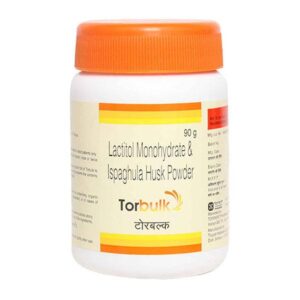ISPHAGULA HUSK + LACTITOL MONOHYDRATE
Isphagula Husk: Isphagula Husk, also known as Psyllium Husk, is a bulk-forming laxative commonly used for the management of constipation. It is derived from the seeds of the Plantago ovata plant.
Mechanism of Action:
Isphagula Husk works by absorbing water in the intestine, forming a gel-like substance. This gel softens the stool, promoting bowel movements and relieving constipation. Additionally, it increases the bulk of the stool, which helps stimulate the muscles of the intestine to move more efficiently.
Use:
It is primarily used to relieve constipation, including in cases of chronic constipation or irritable bowel syndrome (IBS). It may also be used to help regulate bowel movements in individuals who have undergone certain surgeries, such as anorectal surgeries or for individuals with hemorrhoids or anal fissures.
Dose:
The recommended dose of Isphagula Husk varies depending on the individual and the severity of constipation. Typically, it is taken once or twice daily in a dose of 1-2 tablespoons (approximately 5-10 grams) mixed with a full glass of water or another fluid. However, it is crucial to follow the specific dosing instructions provided by your healthcare provider or as stated on the product packaging.
Side Effects:
Isphagula Husk is generally safe and well-tolerated, but like any medication, it may cause some side effects. Common side effects may include bloating, gas, stomach cramps, or mild diarrhea. These side effects are usually temporary and resolve on their own as the body adjusts to the medication. It is essential to drink plenty of fluids while taking Isphagula Husk to prevent dehydration. In rare cases, individuals may experience an allergic reaction characterized by itching, rash, or swelling. If any severe or persistent side effects occur, it is important to seek medical attention.
Lactitol Monohydrate: Lactitol Monohydrate is a medication classified as an osmotic laxative. It is used to treat constipation or to maintain regular bowel movements. Lactitol Monohydrate is commonly prescribed for patients who suffer from chronic constipation, particularly in cases where dietary and lifestyle changes have failed to provide relief.
The mechanism of action of Lactitol Monohydrate involves drawing water into the bowel, which softens the stool and stimulates bowel movement. It is not absorbed into the bloodstream and only acts locally in the gastrointestinal tract.
The recommended dose of Lactitol Monohydrate may vary depending on the severity and response of the individual patient. Generally, it is started at a low dose and increased gradually until the desired effect is achieved. The medication is usually taken orally, often in the form of a powder, which can be dissolved in water or juice. It is important to follow the dosage instructions provided by the healthcare provider.
As with any medication, Lactitol Monohydrate may have some side effects. Common side effects include bloating, flatulence, abdominal discomfort, and diarrhea. These side effects are usually mild and typically resolve on their own without the need for medical intervention. It is important to drink plenty of fluids while taking Lactitol Monohydrate to prevent dehydration due to increased bowel movements.
While Lactitol Monohydrate is generally considered safe, it may not be suitable for everyone. It is essential to inform the healthcare provider of any existing medical conditions, allergies, or medications being taken before starting this medication. They can provide guidance on whether Lactitol Monohydrate is the appropriate choice for the individual patient.

